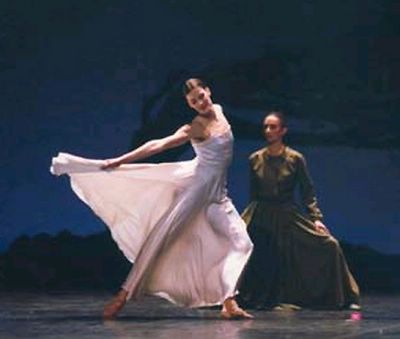
DANCE/Paris
“Wuthering Heights”
Through March 15th
Calling all closet romantics...
Emily Brontë published "Wuthering Heights" in 1847, just before her death at the age of 30. Choreographer Kader Belarbi transforms Brontë’s gloomy novel of love, vengeance and untimely demise into a passionately rendered ballet based on one of the darkest love stories ever told.
Belarbi’s choreography explores the dualities inherent in Brontë’s masterpiece: darkness/light, love/hate and freedom/possession. Fierce, passionate and otherwordly. And there are the moors, besides.
Shown/header image: Marie-Agnes Gillot (Catherine), Nicolas Le Riche (Heathcliff).
Photo: Icare/Ballet de l'Opéra National de Paris
Find it: Opéra National de Paris
Palais Garnier
120 Rue du Lyon/Place de L’Opera
Paris, France
Get there: Metro: Opera (lines 3,7,8)
Get info: + 33 (1) 40 01 80 54
Find out about dance events in other cities, in the FEB/MAR 2005 issue of "Arte Six."

Shown above: Laetitia Pujol (Catherine), Céline Talon (Nelly). Pujol originated the role of Catherine in the initial production of Belarbi's "Wuthering Heights."
Photo: Icare/Ballet de l'Opéra National de Paris
RELATED EXTRAS: Excerpts, "Wuthering Heights" (1847) by Emily Brontë
I was superstitious about dreams then, and am still; and Catherine had an unusual gloom in her aspect, that made me dread something from which I might shape a prophecy, and foresee a fearful catastrophe.
She was vexed, but she did not proceed. Apparently taking up another subject, she recommenced in a short time.
“If I were in heaven, Nelly, I should be extremely miserable.”
“Because you are not fit to go there,” I answered. “All sinners would be miserable in heaven.”
“But it is not for that. I dreamt once that I was there.”
“I tell you I won’t hearken to your dreams, Miss Catherine! I’ll go to bed,” I interrupted again.
She laughed, and held me down; for I made a motion to leave my chair.
“This is nothing,” cried she: “I was only going to say that heaven did not seem to be my home; and I broke my heart with weeping to come back to earth; and the angels were so angry that they flung me out into the middle of the heath on the top of Wuthering Heights; where I woke sobbing for joy. That will do to explain my secret, as well as the other. I’ve no more business to marry Edgar Linton than I have to be in heaven, and if the wicked man in there had not brought Heathcliff so low, I shouldn’t have thought of it. It would degrade me to marry Heathcliff now; so he shall never know how I love him: and that, not because he’s handsome, Nelly, but because he’s more myself than I am. Whatever our souls are made of, his and mine are the same; and Linton’s is as different as a moonbeam from lightning, or frost from fire.”
Ere this speech ended I became sensible of Heathcliff’s presence. Having noticed a slight movement, I turned my head, and saw him rise from the bench, and steal out noiselessly.
He had listened till he heard Catherine say it would degrade her to marry him, and then he stayed to hear no further. My companion, sitting on the ground, was prevented by the back of the settle from remarking his presence or departure; but I started, and bade her hush!
“Why?” she asked, gazing nervously round.
“Joseph is here,” I answered, catching opportunely the roll of his cartwheels up the road; “and Heathcliff will come in with him. I’m not sure whether he were not at the door this moment.”
“Oh, he couldn’t overhear me at the door!” said she. “Give me Hareton, while you get the supper, and when it is ready ask me to sup with you. I want to cheat my uncomfortable conscience, and be convinced that Heathcliff has no notion of these things. He has not, has he? He does not know what being in love is!”
“I see no reason that he should not know, as well as you,” I returned; “and if you are his choice, he’ll be the most unfortunate creature that ever was born! As soon as you become Mrs. Linton, he loses friend, and love, and all! Have you considered how you’ll bear the separation, and how he’ll bear to be quite deserted in the world? Because, Miss Catherine - “
“He quite deserted! We separated!” she exclaimed, with an accent of indignation. “Who is to separate us, pray? They'll meet the fate of Milo! Not as long as I live, Ellen: for no mortal creature. Every Linton on the face of the earth might melt into nothing before I could consent to forsake Heathcliff...Nelly, I see now you think me a selfish wretch; but did it never strike you that if Heathcliff and I married, we should be beggars? Whereas, if I marry Linton I can aid Heathcliff to rise, and place him out of my brother's power.”
“With your husband's money, Miss Catherine?” I asked. “You'll find him not so pliable as you calculate upon: and, though I'm hardly a judge, I think that's the worst motive you've given yet for being the wife of young Linton.”
“It is not,” retorted she; “it is the best!... My great miseries in this world have been Heathcliff's miseries, and I watched and felt each from the beginning: my great thought in living is himself. If all else perished, and he remained, I should still continue to be; and if all else remained, and he were annihilated, the universe would turn to a mighty stranger: I should not seem a part of it. My love for Linton is like the foliage in the woods: time will change it, I'm well aware, as winter changes the trees. My love for Heathcliff resembles the eternal rocks beneath: a source of little visible delight, but necessary. Nelly, I am Heathcliff! He's always, always in my mind: not as a pleasure, any more than I am always a pleasure to myself, but as my own being...”
--
He was there - at least, a few yards further in the park; leant against an old ash-tree, his hat off, and his hair soaked with the dew that had gathered on the budded branches, and fell pattering round him.
He had been standing a long time in that position, for I saw a pair of ousels passing and repassing scarcely three feet from him, busy in building their nest, and regarding his proximity no more than that of a piece of timber.
They flew off at my approach, and he raised his eyes and spoke: “She's dead!” he said; “I've not waited for you to learn that. Put your handkerchief away - don't snivel before me. Damn you all! She wants none of your tears!”
I was weeping as much for him as her: we do sometimes pity creatures that have none of the feeling either for themselves or others. When I first looked into his face, I perceived that he had got intelligence of the catastrophe; and a foolish notion struck me that his heart was quelled and he prayed, because his lips moved and his gaze was bent on the ground.
“Yes, she's dead!” I answered, checking my sobs and drying my cheeks. “Gone to heaven, I hope; where we may, every one, join her, if we take due warning and leave our evil ways to follow good!”
“Did she take due warning, then?” asked Heathcliff, attempting a sneer. “Did she die like a saint? Come, give me a true history of the event. How did - ?”
He endeavored to pronounce the name, but could not manage it; and compressing his mouth he held a silent combat with his inward agony, defying, meanwhile, my sympathy with an unflinching, ferocious stare.
“How did she die?” he resumed, at last - fain, notwithstanding his hardihood, to have a support behind him; for, after the struggle, he trembled, in spite of himself, to his very finger-ends.
“Poor wretch!” I thought; “you have a heart and nerves the same as your brother men! Why should you be anxious to conceal them? Your pride cannot blind God! You tempt him to wring them, till he forces a cry of humiliation.”
“Quietly as a lamb!” I answered, aloud. “She drew a sigh, and stretched herself, like a child reviving, and sinking again to sleep; and five minutes after I felt one little pulse at her heart, and nothing more!”
“And - did she ever mention me?” he asked, hesitating, as if he dreaded the answer to his question would introduce details that he could not bear to hear.
“Her senses never returned: she recognized nobody from the time you left her,” I said. “She lies with a sweet smile on her face; and her latest ideas wandered back to pleasant early days. Her life closed in a gentle dream - may she wake as kindly in the other world!”
“May she wake in torment!” he cried, with frightful vehemence, stamping his foot, and groaning in a sudden paroxysm of ungovernable passion. “Why, she's a liar to the end! Where is she? Not there - not in heaven - not perished - where? Oh! you said you cared nothing for my sufferings! And I pray one prayer - I repeat it till my tongue stiffens - Catherine Earnshaw, may you not rest as long as I am living; you said I killed you - haunt me, then! The murdered do haunt their murderers, I believe. I know that ghosts have wandered on earth. Be with me always - take any form - drive me mad! Only do not leave me in this abyss, where I cannot find you! Oh, God! It is unutterable! I cannot live without my life! I cannot live without my soul!”
He dashed his head against the knotted trunk; and, lifting up his eyes, howled, not like a man, but like a savage beast being goaded to death with knives and spears. I observed several splashes of blood about the bark of the tree, and his hand and forehead were both stained; probably the scene I witnessed was a repetition of others acted during the night.
It hardly moved my compassion – it appalled me: still, I felt reluctant to quit him so. But the moment he recollected himself enough to notice me watching, he thundered a command for me to go, and I obeyed. He was beyond my skill to quiet or console.

Shown above: Gloom on the moors, in "Wuthering Heights" (l. to r.) Laurence Olivier, 1939; Timothy Dalton and Anna Calder-Marshall, 1970; Ralph Fiennes and Juliette Binoche, 1992
Related booklist: "Wuthering Heights," "The Birth of Wuthering Heights: Emily Bronte at Work"; On film: "Wuthering Heights" (1992), "Brontë Country," "Wuthering Heights" (1939), "Wuthering Heights" (1970)

<< Home